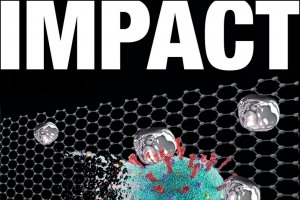PROVIDENCE, R.I. [Brown University] — Within two weeks of the dramatic reduction of in-person activity on campus in March 2020, President Christina H. Paxson announced the establishment of a COVID-19 Research Seed Fund “to fast-track innovative research proposals that directly address the urgent needs of the COVID-19 pandemic.”
After a panel of Brown faculty reviewed applications, 15 seed awards totaling $350,000 and spanning a broad range of disciplines, were announced April 30. In the months that followed, the projects gained momentum.
“This pandemic has tapped into the best of the Brown community, helping the world in a critical moment,” Paxson said. “Brown researchers are having a profound impact on the battle against COVID-19 through their ingenuity in research and wide collaborations.”
In one of the first seed projects fully implemented, a biobank containing plasma and serum samples from patients tested for COVID was set up in May at Lifespan’s Clinical Research Center at Rhode Island Hospital. It was established as a source for researchers at Brown and around the state who needed human plasma and serum samples for COVID investigation.
By fall, more than a dozen teams of researchers were using the samples from patients getting treatment at Rhode Island Hospital and Miriam Hospital. Another team, led by Rosa Baier, an associate professor in the School of Public Health, began publishing issue briefs and developing best practices for future crises in long-term care facilities, based on its national survey of frontline staff during the pandemic.
In their first months of operation, researchers from many other seed projects began publishing dozens of top-tier academic papers based on early findings and started larger collaborations with other institutions.
The seed awards also began to catalyze further external funding — another goal of the awards. Amanda Jamieson, an assistant professor of molecular microbiology and immunology who received funding in two seed awards, also won a Fast Grant from Emergent Ventures and an innovation grant from the state of Rhode Island. After getting a seed award to develop a home testing kit, William Fairbrother, a professor of biology, received an additional grant from the Fred M. Roddy Foundation.
External funding obtained
New research funding opportunities arose quickly from federal agencies, foundations and other external sources during the spring and summer. Brown faculty received external funding totaling millions of dollars, with many applications still pending.
Katherine Mason, an assistant professor of anthropology, received an award from the National Science Foundation. Teaming up with anthropology graduate student Yifeng Cai, who conducted interviews in Shanghai, Mason examined “how people's information consumption can affect the trajectory of the pandemic in different places.”
Project Hope, a not-for-profit organization, funded the Center for Human Rights and Humanitarian Studies at the Watson Institute to train health workers around the world in how to prevent and treat COVID-19. By the fall, the center’s training had reached over 66,000 workers in more than 30 countries, led by director Dr. Adam Levine, who also serves as the director of global emergency medicine at the Warren Alpert Medical School.
The Policy Lab supported Rhode Island's statewide testing program, including collaborating on a COVID-19 dashboard with the School of Public Health in partnership with the Rhode Island Department of Health, to predict key metrics and conduct ongoing surveys to understand beliefs about the virus.
Other projects launched
Emily Oster, a professor of economics and public policy expert, became a national resource on the impact of COVID-19 on children’s education and family issues.
Early in the pandemic, Oster — author of two best-selling data-driven parenting advice books, "Expecting Better" and "Cribsheet" — saw an information gap and created a website and other ways to illuminate detailed data and facts. “We can give people context,” she said.
In collaboration with medical experts, data scientists and Brown students, Oster started the COVID-Explained website, which by July had reached more than 50,000 unique users in a month.
The Pembroke Center Oral History Project recorded conversations about pandemic experiences, focusing on women, transgender people and nonbinary people. The Brown Library collected stories, including paper and digital records, in a community archive from alumni, faculty, students and others.
As a nationally recognized researcher on prison health issues, Dr. Josiah Rich, a professor of medicine and epidemiology at Brown and director of the Center for Health and Justice Transformation at the Miriam Hospital, was active after the onset of COVID-19. His research and advocacy for releasing some U.S. prisoners was published in the New England Journal of Medicine and elsewhere.
